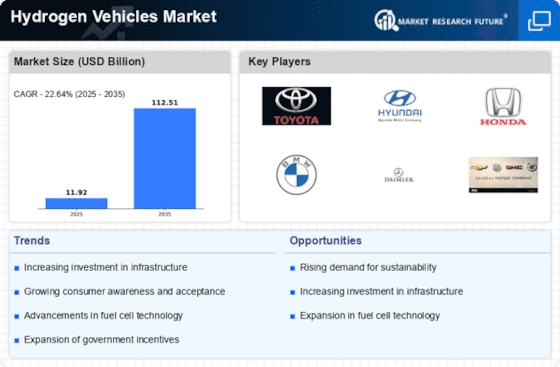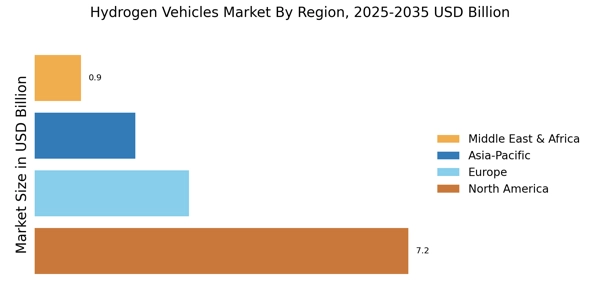Government Support and Regulatory Frameworks
Government support and regulatory frameworks are pivotal in shaping the Hydrogen Vehicles Market. Various governments are implementing policies that promote the adoption of hydrogen vehicles, including tax incentives, subsidies, and research funding. For example, several countries have set ambitious targets for hydrogen vehicle adoption, aiming for millions of hydrogen-powered vehicles by 2030. This regulatory environment not only encourages manufacturers to invest in hydrogen technology but also reassures consumers about the viability of hydrogen as a fuel source. As of 2025, it is estimated that government initiatives could lead to a market growth rate of approximately 15% annually. Such support is crucial for overcoming initial market barriers and fostering a favorable environment for the Hydrogen Vehicles Market.
Expansion of Hydrogen Refueling Infrastructure
The expansion of hydrogen refueling infrastructure is a critical driver for the Hydrogen Vehicles Market. As of October 2025, the number of hydrogen refueling stations is anticipated to increase significantly, with projections suggesting a growth rate of over 20% annually. This expansion is essential for alleviating range anxiety among consumers and promoting the adoption of hydrogen vehicles. Countries are investing heavily in building a robust network of refueling stations, which is expected to enhance the accessibility of hydrogen fuel. Furthermore, partnerships between governments and private enterprises are facilitating this growth, ensuring that the infrastructure keeps pace with the increasing number of hydrogen vehicles on the road. The availability of a comprehensive refueling network is likely to play a pivotal role in the market's expansion.
Technological Innovations in Hydrogen Production
The Hydrogen Vehicles Market is experiencing a surge in technological innovations related to hydrogen production. Advances in electrolysis and steam methane reforming are enhancing the efficiency and reducing the costs associated with hydrogen generation. For instance, the development of renewable energy sources for electrolysis is expected to lower the carbon footprint of hydrogen production significantly. As of 2025, the cost of producing green hydrogen is projected to decrease by approximately 30%, making it more competitive with traditional fuels. This shift not only supports the growth of hydrogen vehicles but also aligns with global sustainability goals. Consequently, the Hydrogen Vehicles Market is likely to benefit from these advancements, as they provide a more sustainable and economically viable fuel source for the automotive sector.
Rising Environmental Concerns and Sustainability Goals
Rising environmental concerns and sustainability goals are driving the Hydrogen Vehicles Market towards greater adoption. As awareness of climate change and air pollution increases, consumers and businesses are seeking cleaner alternatives to traditional fossil fuels. Hydrogen vehicles, which emit only water vapor, present a compelling solution to these challenges. The market is witnessing a shift in consumer preferences, with a growing number of individuals expressing interest in zero-emission vehicles. As of 2025, it is projected that the demand for hydrogen vehicles could increase by over 25%, driven by these environmental considerations. This trend is likely to encourage manufacturers to accelerate their hydrogen vehicle offerings, thereby enhancing the overall growth of the Hydrogen Vehicles Market.
Collaborations and Partnerships in the Automotive Sector
Collaborations and partnerships within the automotive sector are emerging as a significant driver for the Hydrogen Vehicles Market. Major automotive manufacturers are increasingly joining forces with technology companies and energy providers to develop hydrogen fuel cell technologies and vehicles. These collaborations are aimed at pooling resources, sharing expertise, and accelerating the development of hydrogen vehicles. As of October 2025, several high-profile partnerships have been announced, indicating a strong commitment to advancing hydrogen technology. This collaborative approach not only enhances innovation but also helps in reducing costs associated with research and development. The synergy created through these partnerships is likely to propel the Hydrogen Vehicles Market forward, fostering a more competitive landscape.

















